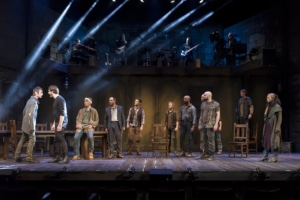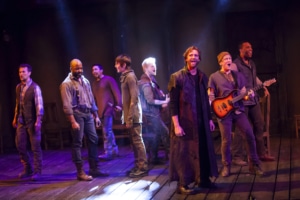DCPA NEWS CENTER
Enjoy the best stories and perspectives from the theatre world today.
Enjoy the best stories and perspectives from the theatre world today.
This article was published on March 23, 2015
They are perhaps the three most impactful days in the history of man, and remarkably little is known about them: the 72 hours between Jesus’ crucifixion and what Christians believe was his resurrection. It was the birth of what is now the world’s largest religion, with about 2.1 billion followers worldwide.

The 12. Photo by Jennifer M. Koskinen
The DCPA Theatre Company’s new rock musical The 12 imagines what those three days must have been like for his closest followers in the immediate, dangerous aftermath of the death of Jesus.
“It’s useful to remember how young these people were,” Pulitzer Prize-winning writer Robert Schenkkan said of the disciples. “These are very blue-collar, gritty, uneducated men. Yet their passion and their ultimate commitment to this individual — and the ideas that he embodied — are so fierce that they all will ultimately give their lives for him. That’s a very powerful idea, and we take that responsibility very seriously.”
But The 12, opening in preview performances on Friday (March 27), is not a narrative play. Set against the backdrop of composer and co-lyricist Neil Berg’s classic rock ’n’ roll score, it is a big, loud, crank-it-up-to-10 musical.
“The culmination of this event in history was, of course, a world-changing revolution of the most potent kind,” said Berg. “Rock ’n’ roll is the anthem of revolution, so that entirely supports this kind of passionate musical expression in our show.”
What The 12 is not, both men said, is a treatise on religion. It is not a polemic. It does not take a stand on the certainty of the resurrection — although, Berg teases, “Everyone will have their own very clear idea of what happens at the end.”
The 12 is instead an imagined, human story, Berg said, based on a real historical event. It is set to original music inspired by Berg’s love of classic rock bands like Led Zeppelin and The Who. In addition to being a trained writer of musical theatre, Berg has a long history as a touring musician with groups like the still-active Joe D’Urso & Stone Caravan. He has opened for Bruce Springsteen and The Doors, and has played at Red Rocks and McNichols Sports Arena.
The score he has produced for The 12, he said, is a perfect match for the angst, the tension and the drive of Schenkkan’s story. “It is going to be authentic rock ’n’ roll, I can tell you that,” Berg said.
The 12 has been described as picking up where Jesus Christ Superstar leaves off, and chronologically speaking, Berg said, that is accurate. However, he says his original musical score “is really an open love letter to classic rock ’n’ roll.”

The 12. Photo by Jennifer M. Koskinen
The 12 will now join a genre of popular Biblical rock musicals of widely different tones, including Superstar, Godspell, Joseph and the Amazing Technicolor Dreamcoat and Children of Eden.
“I think The 12 is a different, great addition to that group,” Berg said. “Because the characters are all trapped in one room this story is intense from the beginning. You’re in it. And the music reflects that.”
Schenkkan, who also wrote the 2014 Tony-winning best play All the Way, loves Superstar and Godspell, but those musicals are far more stylized than The 12, he said. “This is a more natural and thoughtful approach to the material,” he said. “Our approach is much less sensational. And, I think, more powerful because of it.”
It was Schenkkan’s decision not to use Jesus’ name in The 12, and he did it for two reasons.
“First, like so many details in the Jesus story, we can’t be sure about this but it is unlikely in Jewish society at that time that his followers would have addressed him using his name as that would have been considered disrespectful. More likely he would have been called an honorific like, ‘teacher’ or ‘Rabbi.’ Second, it was done to remove a possible barrier between the story and its potential audience.
“The phrase ‘Jesus the Lord’ is so loaded in terms of what it will later come to mean. By taking the name out of the equation, it puts the focus back on the immediacy of this very human story.

The 12. Photo by Jennifer M. Koskinen
“The tendency of the audience will be to look at this event with the weight of 2,000 years of bitterly contested doctrine, and everything that comes with that. We are trying to strip all of that away and say, ‘Wait a minute: What if you were one of these fishermen on the sea of Galilee, and this guy you might have heard something about comes up to you and says, ‘Follow me.’ And for reasons that are not clear even to you in that moment, you do, because there is something about him that compels you. What does that mean? It is kind of unfathomable.”
To Berg, the central question is this: “When the head of this revolutionary group is suddenly killed, what makes these followers continue on?”
Still, Schenkkan understands why potential audiences may feel some trepidation about what is, for now, a theatrical unknown.
“Oftentimes, unfortunately, when writers have dealt with issues of faith, it’s hard not to feel that there is some condescension there. Some smugness. Some superiority,” Schenkkan said. “That’s unacceptable, quite honestly. I think it’s prejudice.
“We have tried very seriously to get at this fundamental question of belief and commitment to something which cannot ultimately be proved in rational, scientific terms. And to me, that is a very exciting, dramatic proposition: How does one get there? We have all experienced a dark night of the soul. A time where everything we have believed in whether it is a religious expression or an idea or a cause has failed us. And we have to find a way to go forward. To recover our faith and our belief. That’s at the heart of what we are trying to do here.
“And it’s why I believe that all of our audience — including members of all various faith-based communities — will find this a story that is not only accessible and respectful, but also very compelling.”
